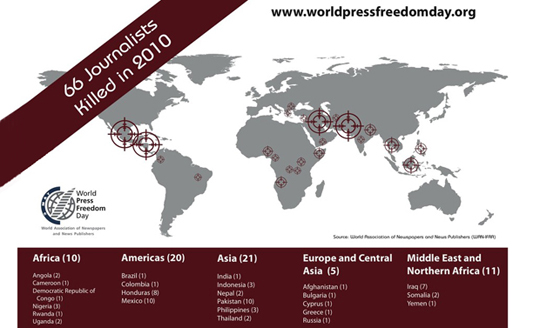Today is World Press Freedom Day. It comes at a time when news organisations and freelance journalists working to report on uprisings in the Arab world have battled, and are still battling, restrictions on their ability to do their job.
In Egypt we heard of news bureaux being shut down during the protests in the country, in Libya foreign journalists told of ‘days of brutality’ in detention while two Western journalists were killed while trying to cover the conflict. And beyond the uprisings, across the world, there are daily reports of journalists, both local and foreign, being prevented from carrying out their work to report on the events around them, through legal action, technological blackouts or violence and intimidation.

Journalists killed around the world in 2010. Infographic supplied by World Association of Newspapers and News Publishers
So today has been marked as a day to show support for the journalists fighting for a free press and to remember those who died doing so. The BBC reports that “hundreds, if not thousands” of events are being held across the world today. For its part director of BBC Global News Peter Horrocks has called for a minute’s silence at 11am “to mark the sacrifices made by journalists in the name of press freedom, and to honour those who have been killed”.
Some might see this as just a gesture, which will surely not be observed by all. But the turmoil, anguish and the death toll from the Arab Spring revolts and revolutions have brought home as rarely before how critical the role of journalists is, in not just doing a job, but reporting on events which decide the fate of nations.
The World Association of Newspapers and News Publishers (WAN-IFRA) is providing a range of material including interviews, infographics and cartoons, for news outlets to use to highlight the meaning of the day.